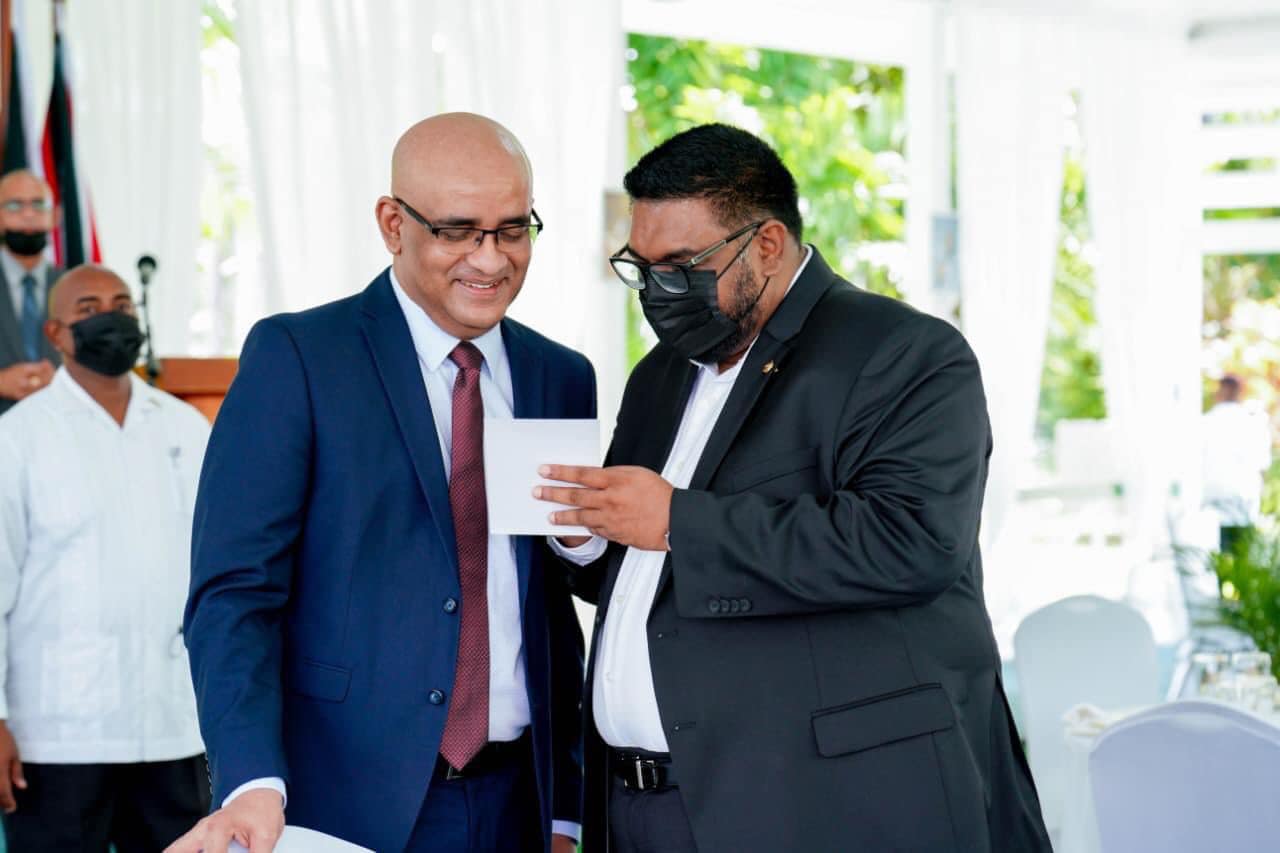‘People-centred and geared towards transformation’ are the words being used to describe Guyana’s first national budget set to be presented today in Parliament which will be backed by some of the more than US$600 million in oil revenues now sitting in the country’s Natural Resources Fund.
“Budget 2022 would be people-centred and people-driven, focusing on policies and programmes that will continue the transformation of our country and expand and improve the delivery of services,” President Mohamed Irfaan Ali said in a pre-budget 2022 address to the new oil producing nation.
Mr. Ali pointed to several areas of focus, including economic expansion, increased productivity, enhanced competitiveness, stable macroeconomic fundamentals, capacity building and supporting a stronger private sector.
He reminded that when his party assumed office in August 2020, the immediate tasks were to restore the economy, address job loss, address the negative image of Guyana, and enhance the confidence level in the investment climate of the country.
“I am very pleased to say that we have been able to address all of these issues and place Guyana now in a stable environment in which international investors, sophisticated investors, and the local private sector are once again actively seeking out opportunities in our country,” he said.
Mr. Ali reiterated that his administration has been able to make the point not only through narrative but through concrete measures that Guyana is not only about oil and gas but also about sustainable development.
Putting more money in people’s pockets
The Guyanese head of state disclosed that the policy agenda and measures in this year’s budget would be geared towards, among other objectives, increasing disposable income.
“And this is critical. We must have more disposable income available to the population. In Budget 2022, I have asked the Minister of Finance to include specific measures that will be geared at enhancing and improving your disposable income, ensuring that there is more money available to families, more money available in the economy,” he said.
Additional measures include maintaining a low tax environment, expanding and creating job opportunities, better health care and educational services, greater public-private partnerships and greater support for the vulnerable.
Continue infrastructure and housing boom
Mr. Ali said aggressive steps, through financing, will be taken in the budget to realise the construction of many new roads, highways, bridges and other key infrastructure to catalyse growth and development.
“These are strategic infrastructure, transformative infrastructure of high priority and great magnitude that budget 2022 will be addressing,” he pointed out. “This is the year that will inject the fuel that will lead to the transformation we want to achieve and budget 2022 will inject that fuel to catalyse the growth in an aggressive and forward-looking manner.”
Additionally, he said housing continues to be a key pillar that will improve lives and enhance equity.
To this end, tremendous investments will be made in expanding new infrastructure to meet the target of 50,000 house lots as stated in his party’s manifesto.
“We’ll also be investing heavily in industrial and manufacturing development to ensure that we create sustainable communities in which there is a match between community development and economic expansion and opportunities,” Mr. Ali said.
Social services and security
At the same time, he assured that government will be investing in bringing world-class healthcare services to every citizen in the country and working towards improving the well-being of children and the elderly.
“Budget 2022 will ensure children get more. I’ve instructed that specific measures be in the budget to enhance the welfare and well-being of children,” he said. “We will set aside greater support for the elderly. We will accelerate our scholarship programme.”
He said government will continue to support the vulnerable, create room for direct medical support for the population and enhance investments in the security sector. This will be done through the use of technology and capacity building, while at the same time fulfilling the promise of better working conditions, welfare and equipment for men and women in the joint services.
Creating more jobs
In the oil and gas sector, Mr. Ali noted that this year’s budget will set aside resources for the development and expansion of opportunities for locals through the implementation of the Local Content Bill in order to create more job opportunities, investment opportunities, wealth creation, training and education by integrating government’s oil and gas strategy with its national development plan.
“We have made it very clear that revenues from the oil and gas sector must be used to make the other sectors more competitive and must be utilised in a way to expand the economic framework of our country; to improve our competitiveness to enhance our sustainability, to build an economy that is standing on many different legs that can withstand global shocks, that can weather storms when they come,” he said.
Bringing down cost-of-living
Importantly, the head of state announced that a specific, sizable allocation will be made to address the issue of cost-of-living.
“We will continue to implement measures to reduce the cost of fuel. We will extend measures to address the issues of the cost of freight. Specific measures will be announced that will reduce the costs of borrowing for homeownership,” Mr. Ali pointed out.
Injection of oil revenues
Guyana has been borrowing to finance its budget for decades but plans to lower its fiscal deficit this year with the injection of oil revenues, Vice President Dr. Bharrat Jagdeo said in an interview last week.
“The fiscal deficit this year, in this budget, would be lower than the fiscal deficit in last year because from a financing perspective, that means we’d have to borrow less because some of the oil and gas revenue will go to replace the high level of borrowing that we have had,” Mr. Jagdeo said.



